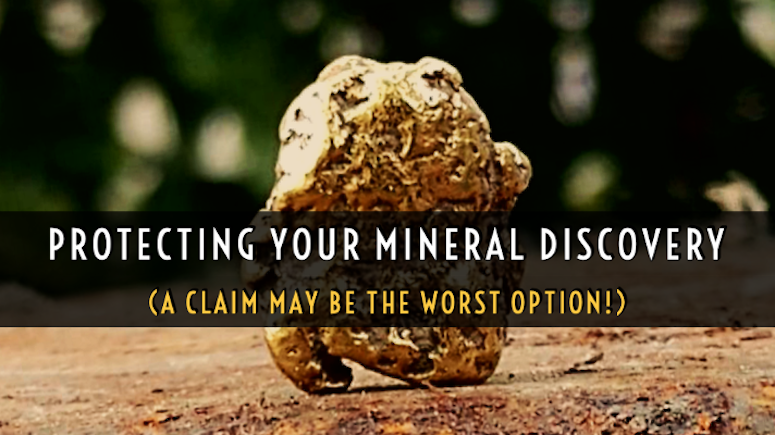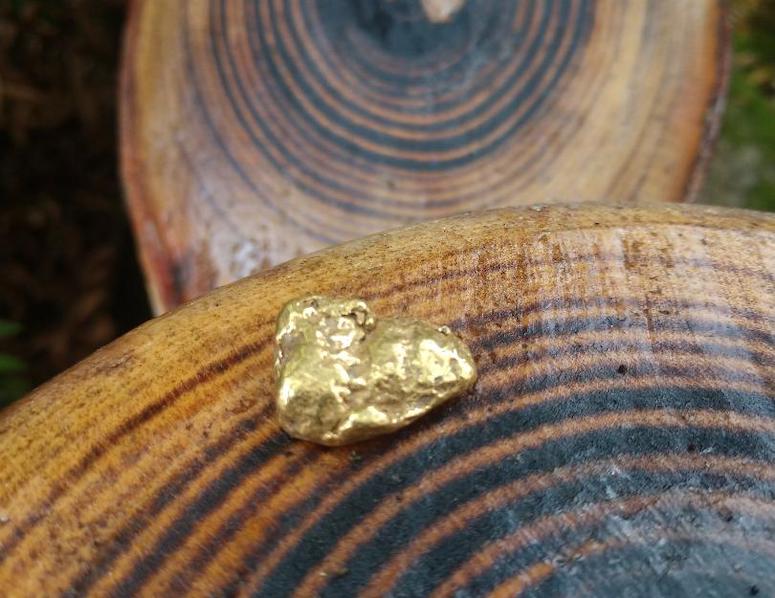
Strike gold and stake your claim!
That is what most miners dream of doing. In most Western states a prospector can still go out and stake a mineral claim and make a living off the land.
It’s not easy I assure you, but there are still valuable mineral deposits that can be profitably mined.
Filing a gold claim isn’t a whole lot different than it was back during the Gold Rush. The General Mining Act of 1872 still protects an individuals rights to stake a claim on Federal Lands and claim ownership of any mineral deposits within its boundaries.
This isn’t the Wild West anymore though, and although in many cases it is a good idea to claim a valuable mineral deposit, there are situations where I would actually encourage you not to.
Let’s take a look at a few reasons why it might be in your best interest NOT to file a mining claim on a rich gold deposit that you have discovered.
Keeping the Discovery Secret from Others
This is the primary reason why I would tell a miner to give strong consideration to whether filing a claim is really the best plan. Once your claim is filed and recorded, anyone from the public can look it up.
Most folks think of a claim as “protection” from other people, but this can actually a double-edged sword. Yes, in the eyes of the law you are the owner of the mineral rights, but that does nothing to protect you from a person from sneaking onto your claim when you aren’t around and high-grading material while you are away.
Do you plan to spend a significant amount of time on your claim, or will this just be a place where you come one or two weekends each year? How do you plan on preventing high-graders from working your claim while you are away?
I assure you, if you stake a mining claim but you aren’t on-site, there will be plenty of people, legal or not, who will sneak in and prospect when you aren’t around. Just staking a claim and posting signs is not enough.
So just consider the possibility that filing a claim on a piece of property that was previously unclaimed might actually be counterproductive. Rather than protecting the gold for yourself, you might actually be signaling to others… “Hey come check this area out! I just filed a claim on it. Maybe there is something valuable here!”
If you had never filed a claim and just prospected the area quietly then perhaps you would’ve been better off.
Isolated Site with Low Risk of Competition
Directly related to what we were talking about above, let’s consider the possibility of someone else stumbling upon a mineral discovery and staking a claim before you get a chance to. Even if you were already mining a location, if you don’t actually stake a claim then this is a very real possibility.
That most certainly would be a nightmare scenario. No one wants to lose out on a prime gold prospecting location. Certainly there are times when filing a claim is the safest bet.
But another scenario might be that you are highly unlikely to have someone claim overtop of you. One of these situations might be when you are a long distance from any roads or well-traveled areas.
I have spots that are a 2+ mile hike to get to. I have to pack in all my gear on my back. The creek has good gold, but it runs seasonally and is only productive to sluice for a few weeks in the spring, most years. There aren’t many folks that far in either, and I highly doubt that anyone is going to bother staking a claim on the site.
Basically, if you can go “under the radar” and prospect a location quietly without being seen by others, it might not be necessary to protect the discovery with a claim. There’s a good chance that you can quietly mine the area for years with no hassle.

Small Deposit that Can be Mined Out Quickly
Here is another scenario that I run into quite a bit when I am metal detecting. Many of the gold patches that I find when out metal detecting are quite rich, but they don’t really produce for very long.
Yes, if I spend enough time hammering an area I can usually keep finding some gold, but the “cream of the crop” is usually gone after a few visits. There really isn’t any value for me to claim the site because I can get gather up most of the gold in short order. Once I’ve found the majority of the gold it’s time to move on to a new area.
Also Read: Detecting Gold in Hammered Areas – Seeking out the “Crumbs”
Minerals are Not Worth the Hassle or Cost
The same could also be said for a creek with low-value concentrations of gold. I know lots of areas that you can find a few bucks worth of gold if you work at it all day, but is this really a valuable deposit? If a site doesn’t produce enough gold to pay for the gas to get there, then it’s probably not worth the money to stake a claim.
A lot of the claims you see for sale by claim-flippers on eBay and other sites would usually fall in this category. Sometimes they are within a known mining district, but the actual location of the claim is of very little value. Other times the claim may be over a historically rich mine, but it is now more-or-less worked out.
You have to determine not only whether gold is present, but also if it is present in payable amounts. Historic production numbers are not an indication of what is there now.
Much like an investment manager would tell you “past success does not indicate future results,” the mere presence of an old mining structure or a tunnel in the ground does not mean that gold is still there. And it certainly isn’t enough to justify staking a claim (or buying one) without determining its value for yourself.
Next: Can You Actually Make Money Mining for Gold?
